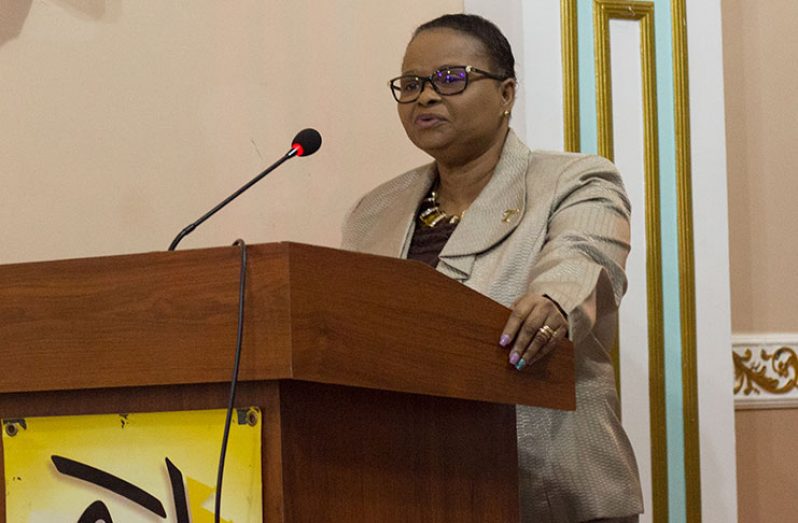HEALTH advocates are being trained by the Public Health Ministry in collaboration with local, regional and international partners and religious institutions, to educate the residents in their communities on the importance of maintaining healthy lifestyles and simultaneously on the dangers of chronic Non-Communicable Diseases (NCDs).

The health advocates were drawn from religious institutions in Regions Three and Four, and are currently undergoing training at the Regency Hotel. This is the first workshop for Health Advocates from the CONTACT STUDY PROJECT.
On Monday, during the opening ceremony, Public Health Minister, Volda Lawrence told those present that the prevalence of NCDs in Guyana remains a major problem. “The statistics on NCDS worldwide are alarming, and Guyana’s situation reflects the global trend since about 57 per cent of the adult population is suffering from one of the main NCDs, and annually, approximately 70 per cent of all deaths between 35-60 years reported to the Ministry of Public Health, are related to heart disease and hypertension, diabetes, cancers or chronic lung disease,” the Public Health Minister pointed out.
In fact, Guyana and the Twin Island Republic of Trinidad and Tobago have been ranked as first and second respectively, in terms of the prevalence and deaths from heart disease and diabetes.
Minister Lawrence said it was for this reason that President David Granger, during the launch of the National Presidential Commission to combat NCDs, underscored the importance of intensifying awareness campaigns on the importance of living healthy lives and the dangers associated with NCDs.
In expressing deep gratitude to all the stakeholders, who are partnering to execute the research project, the Public Health Minister said communities, in addition to the need for them to become more actively involved, they must be educated on the pivotal role they need to play in addressing the multidimensional causes of NCDs.

“It is regrettable to mention this, but I am convinced that our residents in our communities, in fact a significant percentage of our general population is not fully cognizant of the threat to life that non-communicable diseases embody. Their behaviour and lifestyles seem to indicate, despite the startling data, that they have not fully grasped the risks and the extent to which they are exposed with respect to NCDs,” she explained.
For this reason, Minister Lawrence said the workshop intervention to school residents about the modifiable risk factors, which, if acted on, can result in their enhancement of life and the enjoyment of the good life, is critical.
“These figures underscore, my esteemed Health Advocates, the major health challenges that NCDs pose to our country and the tremendous responsibility placed upon your shoulders to reach out to the residents of your church communities and to impress upon them the need to educate themselves and others thereby making the necessary accommodations that would result in stemming the overwhelming cancerous tentacles of NCDs,” she told the health advocates.
In keeping with the political declaration made at the High-Level meeting of the UN General Assembly, the health advocates have been tasked with enlightening their religious groups on the strategies to prevent and control heart disease and stroke, diabetes, hypertension, obesity and cancer by addressing their causal risk factors of unhealthy diet, physical inactivity, tobacco use and alcohol abuse.
Such actions aid in reducing the number of premature deaths from NCDs by 25 per cent by 2025 thereby lessening the burden on our Health Sector.
“Health Advocates, Nurses who will train our Health advocates, Research Staff, in short all those involved in this activity, we cannot close our eyes to the timeline 2020, 2025; 2030; time is the of essence; we all have to have the same vision and work in sync to unanimously stop the epidemic of chronic NCDs threatening our human resource which is so pivotal to the social and economic sustainability of our country,” Minister Lawrence emphasised.
Meanwhile, Minister within the Ministry of Public Health, Dr. Karen Cummings, who was also present, said the task entrusted on the health advocates is a very critical one.
“You will be the champions of good health and healthy lifestyles through your interactions with the members of your communities. Through your words and actions, you will be leading one of the greatest change movements in this country. You already have a captive audience through the various FBOs you represent, therefore it will be imperative that you utilize every opportunity available to reach out and create impactful change in your respective communities as it relates to spreading awareness about NCDs and the accompanying lifestyle changes that are necessary to effectively reduce and possibly reverse its impact,” Minister Cummings posited.
Armed with the knowledge to facilitate in behavioral and lifestyle changes, the advocates must remain committed in spite of the challenges faced, she added, while noting that persons often times find it difficult to adapt to lifestyle changes.
Minister Cummings also used the opportunity to applaud the coordinators of the CONTACT STUDY.



.jpg)










